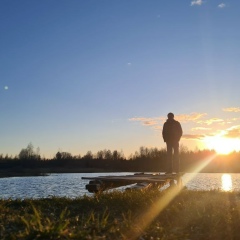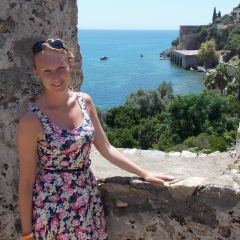Отрывки из книги Гилберта Кийт Честертона "Вечный Человек".
Про Рождество
"Во многих смыслах наша вера – религия маленьких вещей. Я уже говорил, что Предание – и в книгах, и в картинах, и в легендах – отдало дань парадоксу о Боге в яслях. Наверное, меньше говорилось о Боге в пещере. Как ни странно, о пещере вообще говорили мало. Рождество Христово переносили в любую страну, в любую эпоху, в любой ландшафт и город, подгоняли к самым разным обычаям и вкусам, – и, это очень хорошо. Всюду мы видим хлев, но далеко не всюду – пещеру. Некоторые ученые по глупости нашли противоречие между преданием о яслях и преданием о пещере, чем доказали, что не были в Палестине. Им мерещится различие там, где его нет, но они не видят его там, где оно есть.
Миф Рождество или тайна, пещера играет в нем совсем особую роль – она говорит о том, что Бог наш был бездомным изгоем. Однако о пещере вспоминают реже, чем о других атрибутах Рождества.
Причина проста и связана с самой природой возникшего тогда мира. Нелегко увидеть и описать новое измерение. Христос не только родился на земле – Он родился под землей. Первое действие божественной трагедии развертывалось не выше зрителя, а ниже, на темной потаенной сцене. Почти невозможно выразить средствами искусства одновременные действия на разных уровнях бытия. В вифлеемском парадоксе внизу было небо.
Наверное, это самая тайная из тайн рождественской пещеры. Люди ищут под землею ад, здесь под землею – небо. Мир перевернулся.
Ни один языческий миф или философская притча не трогают нас так сильно, как само слово «Вифлеем». Ни один рассказ о рождении бога или детских годах мудреца не стал Рождеством и даже не похож на него. Он всегда или слишком холоден, или слишком фриволен, или слишком разумен, или груб, или утончен. Слушая его или читая, никто из нас, что бы он ни думал, не ощущает, что пришел домой. Мы можем восхищаться его красотой, или глубиной, или чем-нибудь еще, но не всем сразу.
В том-то и дело, что предание о Рождестве, в отличие от всех преданий, не обращает наши мысли и чувства к величию – к тем исключительным, особенным созданиям, которые зовутся богами и героями, пусть даже самого возвышенного и здравого толка. Оно не гонит нас куда-то вдаль, на край света. Скорее можно сказать, что оно возникает изнутри, встает из тайников сознания; так трогают нас маленькие вещи или тихие добродетели бедных.
Мы находим забытую комнату в глубине нашего дома, открываем дверь – и видим свет; откапываем что-то в глубине сердца – и попадаем в край добра. Сложено это не из того, что мир назвал бы крепким; вернее, крепость в легкости, в невесомости, все это было в нас, но вдруг мимолетное чувство стало вечным.
Это было минутной слабостью, а стало силой и спасением. Несмелая речь и забытое слово окрепли навек, когда волхвы вернулись в дальние страны и умолкли шаги пастухов, а под слоями тьмы и камня осталось то, что человечней человечности.
Про Рождество
"Во многих смыслах наша вера – религия маленьких вещей. Я уже говорил, что Предание – и в книгах, и в картинах, и в легендах – отдало дань парадоксу о Боге в яслях. Наверное, меньше говорилось о Боге в пещере. Как ни странно, о пещере вообще говорили мало. Рождество Христово переносили в любую страну, в любую эпоху, в любой ландшафт и город, подгоняли к самым разным обычаям и вкусам, – и, это очень хорошо. Всюду мы видим хлев, но далеко не всюду – пещеру. Некоторые ученые по глупости нашли противоречие между преданием о яслях и преданием о пещере, чем доказали, что не были в Палестине. Им мерещится различие там, где его нет, но они не видят его там, где оно есть.
Миф Рождество или тайна, пещера играет в нем совсем особую роль – она говорит о том, что Бог наш был бездомным изгоем. Однако о пещере вспоминают реже, чем о других атрибутах Рождества.
Причина проста и связана с самой природой возникшего тогда мира. Нелегко увидеть и описать новое измерение. Христос не только родился на земле – Он родился под землей. Первое действие божественной трагедии развертывалось не выше зрителя, а ниже, на темной потаенной сцене. Почти невозможно выразить средствами искусства одновременные действия на разных уровнях бытия. В вифлеемском парадоксе внизу было небо.
Наверное, это самая тайная из тайн рождественской пещеры. Люди ищут под землею ад, здесь под землею – небо. Мир перевернулся.
Ни один языческий миф или философская притча не трогают нас так сильно, как само слово «Вифлеем». Ни один рассказ о рождении бога или детских годах мудреца не стал Рождеством и даже не похож на него. Он всегда или слишком холоден, или слишком фриволен, или слишком разумен, или груб, или утончен. Слушая его или читая, никто из нас, что бы он ни думал, не ощущает, что пришел домой. Мы можем восхищаться его красотой, или глубиной, или чем-нибудь еще, но не всем сразу.
В том-то и дело, что предание о Рождестве, в отличие от всех преданий, не обращает наши мысли и чувства к величию – к тем исключительным, особенным созданиям, которые зовутся богами и героями, пусть даже самого возвышенного и здравого толка. Оно не гонит нас куда-то вдаль, на край света. Скорее можно сказать, что оно возникает изнутри, встает из тайников сознания; так трогают нас маленькие вещи или тихие добродетели бедных.
Мы находим забытую комнату в глубине нашего дома, открываем дверь – и видим свет; откапываем что-то в глубине сердца – и попадаем в край добра. Сложено это не из того, что мир назвал бы крепким; вернее, крепость в легкости, в невесомости, все это было в нас, но вдруг мимолетное чувство стало вечным.
Это было минутной слабостью, а стало силой и спасением. Несмелая речь и забытое слово окрепли навек, когда волхвы вернулись в дальние страны и умолкли шаги пастухов, а под слоями тьмы и камня осталось то, что человечней человечности.
Excerpts from Gilbert Kiit Chesterton's book The Eternal Man.
About Christmas
"In many ways, our faith - the religion of small things. I have already said that Tradition - in books, in paintings, and legends - paid tribute to the paradox of God in the manger. Probably less said about God in the cave. Oddly enough , they said little about the cave. Christmas was transferred to any country, to any epoch, to any landscape and city, driven to the most different customs and tastes - and this is very good. Everywhere we see a stable, but not everywhere - a cave Some scientists foolishly found a contradiction between the tradition of the manger and the tradition of the cave, m have proved that they were not in Palestine. They are imagining a distinction where there is none, but they do not see it where it is.
Christmas myth or mystery, the cave plays a very special role in it - it says that our God was a homeless outcast. However, the cave is remembered less often than other attributes of Christmas.
The reason is simple and connected with the very nature of the world that has arisen then. It is not easy to see and describe a new dimension. Christ was not only born on earth, He was born under the earth. The first act of the divine tragedy unfolded not above the viewer, but below, on a dark secret scene. It is almost impossible to express by means of art simultaneous actions at different levels of being. In the Bethlehem paradox below was the sky.
This is probably the most secret of the secrets of the Christmas cave. People are looking for hell under the earth, here under the earth - the sky. World turned upside down.
No pagan myth or philosophical parable touches us as much as the word “Bethlehem” itself. Not a single story about the birth of God or the sage's childhood years has become a Christmas and does not even look like it. He is always either too cold, or too frivolous, or too intelligent, or rude, or refined. Listening to or reading, none of us, no matter what he thinks, feels that he has come home. We can admire its beauty, or depth, or anything else, but not all at once.
The fact of the matter is that the tradition of Christmas, unlike all traditions, does not turn our thoughts and feelings to greatness - to those exceptional, special creatures that are called gods and heroes, even the most sublime and common sense. It does not drive us somewhere far into the world. Rather, it can be said that it arises from within, rises from the caches of consciousness; so little things touch us or the quiet virtues of the poor.
We find a forgotten room in the depths of our house, open the door - and see the light; we dig up something in the depths of the heart - and fall into the edge of good. It is not composed of what the world would call strong; or rather, a fortress in lightness, in weightlessness, it was all in us, but suddenly the fleeting feeling became eternal.
It was a momentary weakness, but became power and salvation. The unshakable speech and the forgotten word grew stronger forever, when the magicians returned to distant lands and the shepherds' steps fell silent, and under the layers of darkness and stone there remained the fact that there was more humanity than humanity.
About Christmas
"In many ways, our faith - the religion of small things. I have already said that Tradition - in books, in paintings, and legends - paid tribute to the paradox of God in the manger. Probably less said about God in the cave. Oddly enough , they said little about the cave. Christmas was transferred to any country, to any epoch, to any landscape and city, driven to the most different customs and tastes - and this is very good. Everywhere we see a stable, but not everywhere - a cave Some scientists foolishly found a contradiction between the tradition of the manger and the tradition of the cave, m have proved that they were not in Palestine. They are imagining a distinction where there is none, but they do not see it where it is.
Christmas myth or mystery, the cave plays a very special role in it - it says that our God was a homeless outcast. However, the cave is remembered less often than other attributes of Christmas.
The reason is simple and connected with the very nature of the world that has arisen then. It is not easy to see and describe a new dimension. Christ was not only born on earth, He was born under the earth. The first act of the divine tragedy unfolded not above the viewer, but below, on a dark secret scene. It is almost impossible to express by means of art simultaneous actions at different levels of being. In the Bethlehem paradox below was the sky.
This is probably the most secret of the secrets of the Christmas cave. People are looking for hell under the earth, here under the earth - the sky. World turned upside down.
No pagan myth or philosophical parable touches us as much as the word “Bethlehem” itself. Not a single story about the birth of God or the sage's childhood years has become a Christmas and does not even look like it. He is always either too cold, or too frivolous, or too intelligent, or rude, or refined. Listening to or reading, none of us, no matter what he thinks, feels that he has come home. We can admire its beauty, or depth, or anything else, but not all at once.
The fact of the matter is that the tradition of Christmas, unlike all traditions, does not turn our thoughts and feelings to greatness - to those exceptional, special creatures that are called gods and heroes, even the most sublime and common sense. It does not drive us somewhere far into the world. Rather, it can be said that it arises from within, rises from the caches of consciousness; so little things touch us or the quiet virtues of the poor.
We find a forgotten room in the depths of our house, open the door - and see the light; we dig up something in the depths of the heart - and fall into the edge of good. It is not composed of what the world would call strong; or rather, a fortress in lightness, in weightlessness, it was all in us, but suddenly the fleeting feeling became eternal.
It was a momentary weakness, but became power and salvation. The unshakable speech and the forgotten word grew stronger forever, when the magicians returned to distant lands and the shepherds' steps fell silent, and under the layers of darkness and stone there remained the fact that there was more humanity than humanity.

У записи 1 лайков,
1 репостов.
1 репостов.
Эту запись оставил(а) на своей стене Олеся Акимова






















